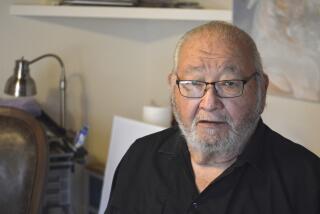A Boy and His Elephant : MOUNT’S MISTAKE<i> by Lew McCreary (Atlantic Monthly Press: $7.95, paper; 295 pp.) </i>
- Share via
The jacket copy of Lew McCreary’s troubling first novel, “Mount’s Mistake,” opens the door to comparison by mentioning E. L. Doctorow and Anne Tyler, but it’s only in the most superficial ways of such history-based fiction that his work belongs in their company. Better comparisons might be Nathanael West in “A Cool Million” and Dickens in the circus passages of “Hard Times.”
The book begins shortly before the turn of the century, with Jay Fielding Mount’s childhood days in Bolusburgh, Ohio. Early on, the town and circumstance lose whatever Midwest conventionality they might have had when, after the accidental death of a boyhood friend, “the shame of the Mount family was offered up to the town for expiation,” through a public whipping of Jay at the hands of his strangely distant but otherwise benign father.
Throughout the book’s earlier sections, McCreary presents a cast of characters who are almost cartoonlike, psychologically, but are all too human in their self-involvement and penchant for gratuitous cruelty and violence. The presentation is lightly comic, but the humor is consistently darkened by circumstances, not the least of which is Mount’s being struck by lightning, an event that permanently dims his mental lights. He becomes from then on a kind of simpleton as he leaves his hometown and sets out into the world with no clear sense of quest.
For a while the novel proceeds in a way that Mount’s middle name, Fielding, might suggest. It takes on a richer humor and episodic eventfulness somewhat reminiscent of Henry Fielding’s picaresque works. But McCreary’s view is darker than that, and while he places Mount in the company of a changing group of oddly comic characters--wonderfully vibrant and stern landladies, eccentric fellow workers--he also places him in a horrific jail for stealing a family photograph from a roommate and in the company of Hin Lin, a poignantly rendered Chinese woman, who burns her own house down in a personal ritual provoked by the finding of an abandoned baby.
Though there’s temporary hope, with Hin Lin and others, that Mount might find a place for himself, his travels to this point are marked by a gradual descent, an increasing disorientation, and the book begins to alter its terms when Mount is rescued from the Mississippi river by the circus barge of Stemple Groves. It is during these travels with the circus, which continue on to the book’s end, that he develops his stronger relationships--the most important and fatal of which is with the elephant, Chloe. It is here also that Thomas Edison enters the book, and while he and Mount never actually meet, events in the life of each have serious implications for the life of the other.
McCreary’s characterizations of Edison and his wife, apart from his delicate rendering of the relationship between Mount and the elephant, Chloe, may be the most memorable achievement of this novel. Edison is presented quite realistically. He’s wise, canny, sophisticated (and of course deaf) and at the same time uncertain and vulnerable. He comes off the page as a slightly exaggerated figure, not quite a historical myth and yet not quite a reality. One of the ways McCreary humanizes him is by implicating him in the events of Mount’s life as both an observer/recorder (through the use of his obsession with movie making) and as an involved party faced with moral choices (through the use of his knowledge of electricity). This is a wonderful stroke on McCreary’s part. It brings the historical Edison into his novel without compromising those historical facts that might keep him apart from it.
The problems with “Mount’s Mistake” are found in its early passages. Readers might be put off by the coy simplicity of the prose there and its jokiness. McCreary seems to want a kind of dark Midwestern folk-tale atmosphere for Mount’s childhood, and he comes very close to getting it, but the writing tends to get corny, the repeated syntax quirky and jokes too predictable. Even the darkness of two deaths (four, counting dogs) and the ritualistic public whipping do not toughen it sufficiently. Nor do the weirdly distant, if acutely drawn characters of Mount’s parents.
But one must stay with this book, give it its first 50 or so pages. The prose tightens then, gets gradually more complex and skillful, and by the time one gets to the circus, to Chloe and Edison, one is hooked.
After Mount has left the house of one of his powerful landladies, shortly before he is taken in by the circus, she thinks of him: “He struck her as an accidental sort of person, and she believed he would always be somber and unhappy, and would perhaps always have the effect of making fundamentally satisfied people experience a gnawing, indescribable discontent whenever he entered a room or came toward them on the street.”
The discontent that Mount engenders finally has to do with love and the lack of it in the lives of those he makes nervous. Not only romantic love, though that surely, but the kind of human caring that things like self-interest, egotism, and a need to constantly compromise always get in the way of. Even Edison is touched by such discomfort.
Like West’s “A Cool Million,” “Mount’s Mistake” mixes a growing-up quest narrative with a comic reversal of the Horatio Alger story. The twist here is that it is Edison and not Mount who embodies the American Dream. And the final twist comes from the ways in which Mount and the elephant, Chloe, are victims of the Dream’s accomplishment.
“Mount’s Mistake” is finally a moral tale, but one that is tempered, rendered even depressing at times, by the gratuitous violence and fundamental greed of the comic and mad world that McCreary so skillfully presents.
More to Read
Sign up for our Book Club newsletter
Get the latest news, events and more from the Los Angeles Times Book Club, and help us get L.A. reading and talking.
You may occasionally receive promotional content from the Los Angeles Times.










